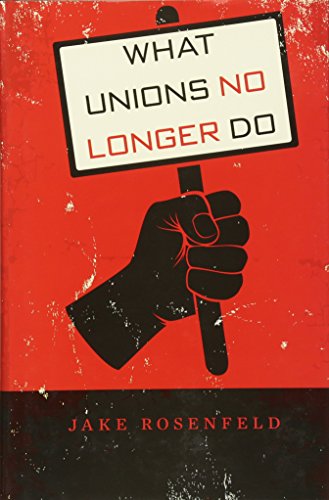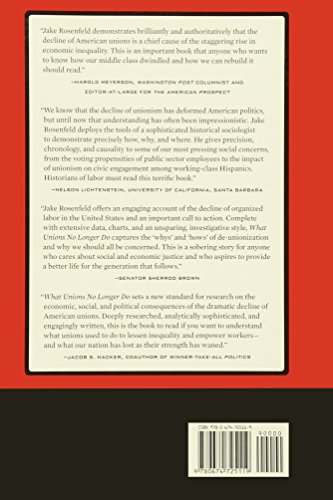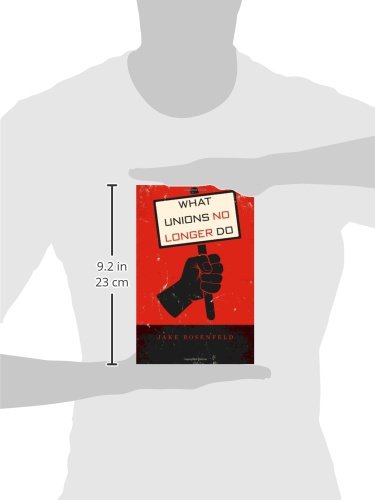Customer Services
Copyright © 2025 Desertcart Holdings Limited




Full description not available
P**O
What Unions no Longer Do
Jake Rosenfeld, a professor in New York, has written a detailed "state of the art" of unions today. I was disappointed that there was not included more specific U.S. legislation, and its impact, legislation which contributed greatly to the demise of union bargaining power and membership. His focus was on the present, and is useful for those who want to know where we are "at", but i feel the overall usefulness of the subject was diminished by the lack of a specific legislative chronology - even as an appendix. There is a lot of text, perhaps as a lecture-type, discussion-leading, presentation, but not an easy read as an immediate information "reference" resource. Important nevertheless, in an essential dialogue.
T**N
Not a great read
This book just gave statistics about union membership and how it was broken down into different categories and gives a brief history about the unions.
A**N
Not just for academics! Important for anyone in business, not just those unionized.
This book provides an essential understanding of the current state of unions, and more importantly, how the current state affects all of us, personally and in business. It it outlines how unions have influence well beyond their membership and how their demise contributes to the widening gap between the haves and have nots. Politicians should read it as should everyone interested in a fair, living wage.
C**R
Sobering
The author uses the research of others and his own to document the societal consequences of the decline in union membership, including the disappearing middle class. It is sobering.
G**M
Excellent work for students and the rest of us.
Jake Rosenfeld has the exceptional ability to provide clear and understandable explanations of complex and interrelated events.
K**Y
Must reading for friends of labor
This book presents careful research into the consequences of the collapse of private sector labor unions in contemporary America. Perhaps the best way to begin this review is to present Professor Rosenfeld's conclusions in his own words: "The collapse of private-sector unions eliminated a tested pathway to the middle class for millions of immigrants and their offspring, exacerbated racial inequality, reconfigured the electorate by reducing the political voice of those lacking a college education, [and] engendered a radical shift in power in American workplaces away from average workers to their employers." Although those of us who believe that a strong labor movement is absolutely essential to a just society have long believed that the destruction of private-sector unions in America is a disaster--not only one of the causes of the staggering increase in inequality in America, but also one of the causes of a disturbing political shift in America to the far right and a politics based on fear, hatred, and paranoia, few of us had the hard empirical evidence to prove our beliefs. Thanks to Professor Rosenfeld, that is no longer case. A careful scholar and social scientist, Professor Rosenfeld, in What Unions No Longer Do, has compiled a truly impressive body of empirical evidence that demonstrates that the collapse of private-sector unions in America is a contributing factor to economic inequality, an exacerbation of the inequality that exists between black and white Americans, and the dumb-downed politics that has poisoned our democracy. The last finding is particularly disturbing for those of us who still believe in democracy. Without a strong labor movement to mobilize average citizens, America has increasingly become a plutocracy. Moreover, since labor was the only effective voice in our political system for programs and policies that benefit average Americans, the plutocrats who rule Washington and most state governments have almost no opposition to their agenda, which is not only to destroy the Great Society of Lyndon Johnson, but also to destroy the New Deal programs that made life under capitalism somewhat tolerable for ordinary Americans. Professor Rosenfeld has not written a political tract, yet he does point out that the death of private sector unions has not only opened the door to the Republican Party to return us to the 19th Century, the absence of labor power has also led to Democratic Party that is also little more than a tool of the plutocracy. Because of the demise of private sector unions, prominent Democrats, like Barack Obama, Bill Clinton, and Hillary Clinton have little concern for the average American struggling to survive in a society that is dominated by the wealthy--in politics, in the corporate controlled media, and our universities.For anyone who thinks that the above observations sound extreme, all I ask of you is that you read this book. The Republican Party in 1947 pushed through the Taft-Hartley Act for the purpose of destroying the American labor movement, the only obstacle to total control of our society by the wealthy. The Republican Party succeeded magnificently. Rarely has a piece of legislation been as effective in achieving its ultimate goal as the Taft-Hartley Act. Private sector labor unions are now irrelevant. Nothing currently exists to prevent our society from becoming even more unequal than it is today. The staggering redistribution of wealth and income to the one percent over the last 40 years is just the beginning. Only labor stood in the way of America's becoming a plutocracy, and now labor is irrelevant. Professor Rosenfeld's careful, scholarly gathering of the data which demonstrates the grim future that awaits us in an America where working people no longer have a voice---at work or in politics---is must reading for anyone who is still idealistic enough to believe that democracy--at work and in politics--is the key to a just society. Professor Rosenfeld's book ranks with Thomas Piketty's Capital in the Twenty-First Century and Joseph Stiglitz's The Price of Inequality as required reading for anyone who cares about economic and political justice.
K**R
Taft-Hartley, the True Cause of Labor's Decline
The real and true cause in the loss of union density within the private is due to the adoption of the Taft-Hartley Amendments to the NLRA and the Democratic Parties failure/refusal to restore the National Labor Relations Act.Prior to Taft-Hartley Labor was not tied to a single political party and endorsed and supported Republicans as well as Democrats as witnessed in Eisenhower's election victory. Prior to the adoption of Taft-Hartley polititions were dependent on Labor to gain approval of their projects while after the adoption of the Taft-Hartley Amendments Labor became dependent on the Democratic Party for protection from the Business Lobby. Taft-Hartley destroyed Labor's ability to effectivly organize and bargain while the public sector counterparts were exempted from Taft-Hartey's negative consiquences. This resulted in growing numbers of represented public sector employees and a contraction of private sector density. Public sector unions are soley dependent on the Political class to further their agenda which has tied public sector unions to the same Democratic Party which has refused to restore the National Labor Relations Act.Subsiquint to Eisenhower's victory high ranking Democratic Party leadership swore to never again allow the American Labor movement to be a organisation independent from political party loyalty and that the political class would never be dependent on working class support to achieve their goals.The Democratic Parties decision to marginalize the working class is what led to Trump's election. By nominating a pro Wall Street, pro RTW, pro free trade, anti-union candidate who ignored the American working class led working class voters to reject the Democratic Party. The fact that the Trump Administration klled TPP within the first week of his Presidency and signaled his decision to renegotiate NAFTA will have a lasting consiquences for Democrats.The Democratic Party's decision to pivot away from the American working class in favor of upper middle class and wealthy voters has been their own undoing.
Trustpilot
2 weeks ago
5 days ago